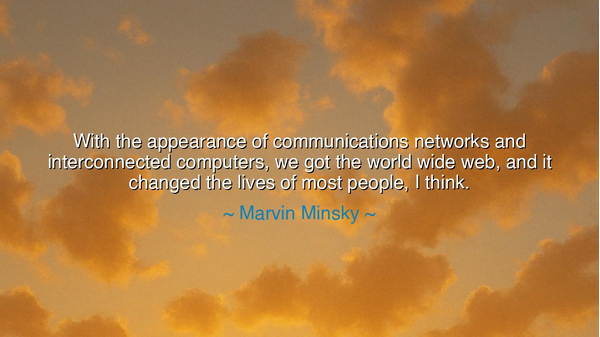
With the appearance of communications networks and interconnected
With the appearance of communications networks and interconnected computers, we got the world wide web, and it changed the lives of most people, I think.






In the grand sweep of history, there are moments when the very fabric of human existence shifts, altering the course of civilizations. Marvin Minsky, one of the great pioneers of artificial intelligence, observed that “With the appearance of communications networks and interconnected computers, we got the world wide web, and it changed the lives of most people, I think.” In these words lies a profound truth: that with the advent of this digital revolution, humanity entered a new era, one that has reshaped how we live, think, and communicate. What once seemed impossible is now our daily reality, where the world is woven together in a web of information, a vast network that has brought people closer and expanded our reach beyond what the ancients could ever have imagined.
Before this age of interconnection, men and women lived in a world divided by distance, language, and time. Travel was slow, and communication was bound by physical limitations—letters, messengers, and the occasional telegraph. But as Minsky notes, the internet changed all of that. The world wide web bridged these gaps, creating a space where information could flow freely, where ideas could travel faster than the speed of sound, and where human connection became not a distant hope but an immediate possibility. It was as if the ancient philosophers had long spoken of unity and interconnectedness, but it was through this network that their ideas found a form that could be shared globally.
To understand the magnitude of this change, one need only look back to the ancient city-states of Greece. In those days, knowledge was confined to the learned few—scribes, philosophers, and the wise men who walked the streets of Athens. Their wisdom was passed through oral tradition and handwritten scrolls. But even the greatest minds, such as Socrates, Plato, and Aristotle, could not have imagined the sheer scale of knowledge that would one day be at our fingertips. The world was vast, yet their reach was limited. The internet, like the great thinkers of the past, sought to expand the boundaries of human understanding, bringing information from every corner of the globe into the homes of all who sought it.
Consider the story of Gutenberg, whose invention of the printing press revolutionized human communication in the 15th century. Before his press, books were rare, hand-copied treasures. After, books became accessible to the masses, democratizing knowledge in a way that had never been seen before. Just as Gutenberg’s press made information available to the common people, the internet took this revolution to an unimaginable scale. Where once knowledge was guarded in libraries, locked behind the gates of institutions, now it is available to anyone with a connection—a transformation as profound as the shift from orality to written word. Minsky’s recognition of the web’s transformative power is an acknowledgment that we are living through another great awakening in the history of communication.
Yet, with this great power comes the potential for chaos and danger. As the world wide web connected us, it also exposed us to the darker aspects of human nature: misinformation, manipulation, and the loss of privacy. Just as the great thinkers of the past warned against the misuse of power, so too must we be vigilant in how we use the internet. Technology, in its essence, is neither good nor evil—it is how we wield it that matters. Minsky’s recognition of the change brought by the internet should serve as a call for us to approach this power with wisdom, to not be swept away by the torrent of information, but to harness it for the greater good of all humanity.
The wisdom of the ancients also teaches us that true connection is not just about communication, but about understanding. As we move forward in this new digital age, it is essential that we not lose sight of the humanity behind the screens. We must not allow the virtual world to replace the real world, but rather use it to enhance our understanding of one another, to foster compassion, and to build bridges where once there were walls. The internet is a tool, a tool that can be used to elevate the human spirit or to isolate it further from truth. The lesson is clear: as we embrace the web, we must remember to connect not only with the information but with the people behind it.
So, let us heed Minsky’s words as a reminder of the promise and perils that lie within our grasp. The world wide web has indeed changed the lives of most people, but how we choose to navigate this new realm will determine whether it becomes a force for good or a tool for division. Let us move forward with awareness, with responsibility, and with a deep commitment to using the connections we have forged to uplift one another. Just as the great minds of the past sought to illuminate the path of human progress, so too must we use the power of the web to light the way for future generations.






AAdministratorAdministrator
Welcome, honored guests. Please leave a comment, we will respond soon